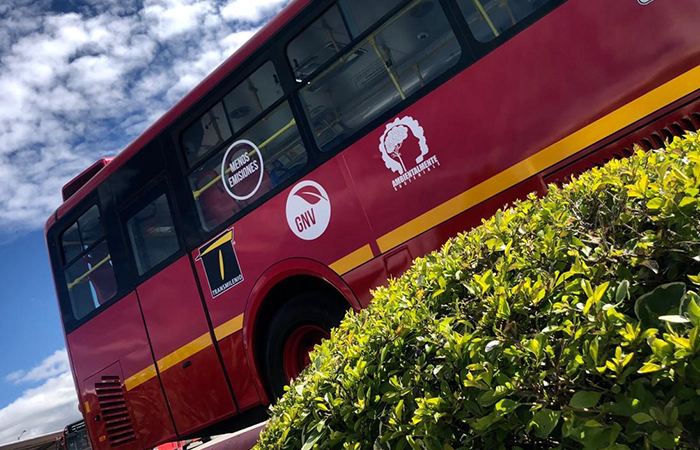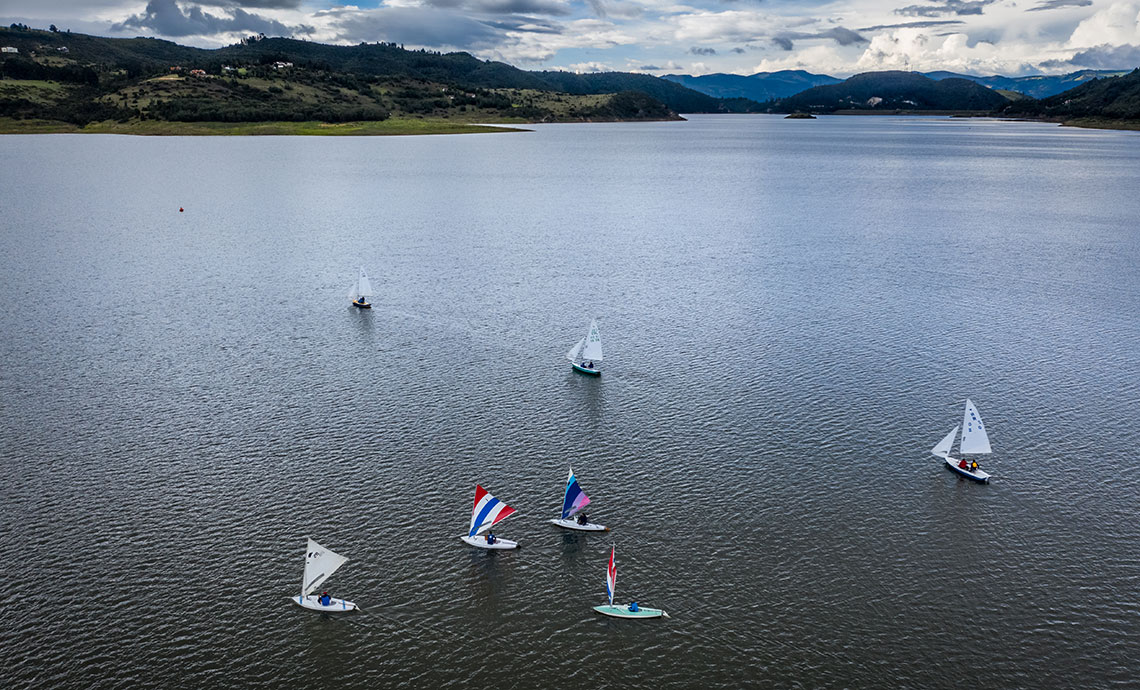
GEB transmission line in La Loma, Cesar

GEB transmission line in La Loma, Cesar
Our climate change management not only ensures the continuity of our business, but also contributes to the identification of opportunities to carry out actions to mitigate impacts and build a more resilient world. For this reason, as a Group we seek to promote low-emissions energy and to lead the transformation towards non-conventional renewable energy sources. We are convinced that we can contribute to de-carbonization, sustainable mobility, innovation and the improvement of air quality in our cities.
Our Strategic Plan and our investments are aligned with the national government’s commitment to reduce carbon emissions by 51 % by 2030, as well as with the national targets established in the countries where we are present. They also reflect the responsibility of the energy sector for carrying out strategic actions and operations to enable achieving these commitments and accelerating the transition toward a clean and sustainable economy.

We developed strategic guidelines to ensure that our operations are responsible with the environment, address the risks and opportunities of climate change, and promote the adoption of sustainable habits by our employees.
We worked on the identification of greenhouse gas emissions related to our own fixed and mobile sources, with consumption of acquired or self-generated energy and emissions by third parties.
| Direct and indirect emissions (Ton CO2eq) | 2017 | 2018 | 2019 | 2020 |
|---|---|---|---|---|
| Scope 1 emissions | 40,961.6 | 143,232.1 | 179,578.6 | 135,920.9 |
| Scope 2 emissions | 551.3 | 558.5 | 1,380.1 | 1,449.0 |
| Scope 3 emissions | 630.7 | 1,027.7 | 2,050.9 | 364.1 |
| Scopes 1, 2 and 3 emissions | 42,143.5 | 144,818.3 | 183,009.5 | 137,734 |
| Click here for additional information on the carbon footprint of affiliates | ||||
Measurement of the carbon footprint is a key component of our Corporate Strategic Plan (SCP) and we report it throughout the year as part of our effort to reduce GHG emissions. We additionally offset the footprint by acquiring carbon bonds that contribute to protecting and preserving native forests.
We also focus efforts on the ecologic connectivity of the territories and on generating processes for the conservation and restoration of strategic ecosystems that help mitigate the impact of climate change, in order to ensure a better future for all.

Nautical sports at the Tominé reservoir, a GEB asset
We fulfilled our goal of reducing our carbon footprint with a 24 % reduction in total Group CO2 equivalent emissions compared to 2019.
We developed the Corporate Carbon tool to facilitate more reliable measurements of the carbon footprint in scopes 1, 2 and 3, which is indispensable for the effects of establishing our road map on emissions over the next few years.
In general, the reductions achieved are explained in part by the implementation of the footprint reduction plans designed by each one of our companies. However, external factors associated with the COVID-19 pandemic contributed significantly to this result. Internally, we highlight the implementation of remote work at home, the reduction of travel and commuting, and the reduction of energy consumption at corporate offices, among others.
We offset 11.5 % of total emissions of GEB (including its affiliates) in 2019 by acquiring carbon bonds for the conservation of native forests, for a total of 21,242 tons CO2eq, which is above the target of 10 % established in the CSP.
We offset 100 % of emissions generated in 2019 by the Transmission and Corporate operations.
At TGI, we voluntarily offset 15,818 tons of CO2eq by means of carbon certificates of the MultiAntioquia Forestry Project, developed in accordance with applicable regulations, validated and verified by Icontec, and registered in the national EcoRegistry platform.
At Cálidda, the emissions of the vehicle fleet for transporting personnel and of the website were offset by acquiring carbon credits of the project Nii-Kaniti of AIDER. This enabled us to obtain the carbon neutral certificate.
(305-5) At the Transmission operation, we established an operations control plan focused on the reduction of leaks of SF6 gas at the substations, considering that these accounted for 92.28 % of emissions in 2019. We took appropriate action and prevented emissions of 748.93 tons of CO2 equivalent
Toward the end of 2020, we initiated the development of a Corporate Climate Change Policy.
(305-5) At TGI, we implemented the “Plan de reparación de los componentes identificados en el inventario de emisiones fugitivas de la infraestructura” (Plan to repair components identified in the infrastructure’s fugitive emissions inventory), carried out by the Maintenance Department at the Padua gas compression station. We obtained a reduction of 462 tons of CO2eq.
We measured all emissions of Electro Dunas and established an emissions scope and baseline to define its reduction targets.
At TGI, we included in the strategic and process risks matrix items related to climate and external physical agents, such as geological and hydrological risks identified in the disaster risk management projects (PGDR, for the Spanish original) and which are held on file by ANLA. We recognize the importance of taking these risks into consideration in view of their potential impacts on the infrastructure, the community and the operations, in addition to their repercussions on finances and reputation in the event of a failure in service continuity.
In Cálidda and Contugas, we received recognition from the Ministry of the Environment for the carbon footprint report through the Carbon Footprint Peru platform.
Cálidda is a member of the Climate Action Task Group (SDG 13) led by Peru 2021, and we are involved in the routes of the carbon footprint and cleaner production.
We will be leaders in industry initiatives that contribute to clean growth, sustainable mobility and air quality.
Move forward in developing a Corporate Climate Change Policy to guide management at all our companies.
Remain a key player in the energy transformation of the countries in which we operate.
Implement climate change adaptability and vulnerability strategies that enable us to identify risks and possible future scenarios, and build resiliency.
Continue to offset the emissions generated by GEB and its affiliates in 2020.
(103-2) Reduce total emissions of the Group by 10 % by 2025, with 2019 emissions as baseline.
Broaden the 2020 carbon neutral certification at Cálidda to additional emission sources
Begin measuring fugitive emissions throughout TGI’s infrastructure and consolidate the Maintenance Plan for these emissions on a permanent basis.
Consolidate strategies at TGI to reduce natural gas consumption by compressors.